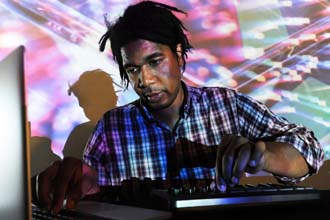Video jockey adds 3D wizardry to events
Quentin Ward paints with pixels instead of spray paint cans. With his passion for video mapping, he loosely terms himself an “electronic graffiti artist.” Ward, a user systems analyst for Tulane University for the past five years, uses various technologies to video map at live events and music festivals around the city.

Quentin Ward, a user systems analyst on staff at Tulane University, uses various technologies as a video jockey at live events and music festivals around the city. (Photo by Sally Asher)
Ward first became interested in video mapping while working as a graphic designer.
“One day one of my friends asked if I could design animation for a projection that would play behind him during his show. After word got out that I was able to not only design the flyer but also come up with visual looks for the show, I became the go-to VJ (visual jockey) among my friends who just happen to be promoters, musicians and artists.”
His creative opportunities soon multiplied.
The ability to take a sketch or idea from a production manager, musician or corporate client and make it come to life on a massive scale is something that Ward enjoys. He specializes in interaction design, live branding and live audio-visual production.
Ward is actively conceptualizing new ideas and developing new technologies for events, from 3D mapping to video content for interactive installations. He also appreciates the collaborative efforts with the small group of VJs working in the industry.
Although a flash of pixels across a screen is not permanent, Ward"s influence on this modern art and technology may be.
